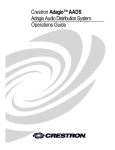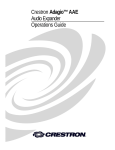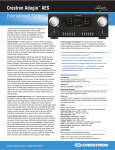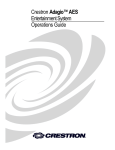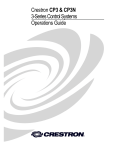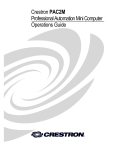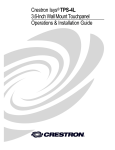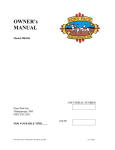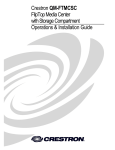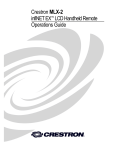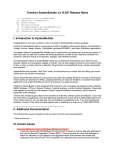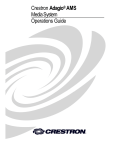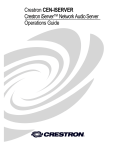Download Operations Guide: AADS
Transcript
Crestron Adagio AADS Adagio Audio Distribution System Operations Guide ® Important Safety Instructions • • • • • • • • • • • • • • • • • • Read these instructions. Keep these instructions. Heed all warnings. Follow all instructions. Do not use this apparatus near water. Clean only with dry cloth. Do not block any ventilation openings. Install in accordance with the manufacturer's instructions. Do not install near any heat sources such as radiators, heat registers, stoves, or other apparatus (including amplifiers) that produce heat. Do not defeat the safety purpose of the polarized or grounding-type plug. A polarized plug has two blades with one wider than the other. A grounding-type plug has two blades and a third grounding prong. The wide blade or the third prong are provided for your safety. If the provided plug does not fit into your outlet, consult an electrician for replacement of the obsolete outlet. Protect the power cord from being walked on or pinched particularly at plugs, convenience receptacles, and the point where they exit from the apparatus. Only use attachments/accessories specified by the manufacturer. Use only with the cart, stand, tripod, bracket or table specified by the manufacturer or sold with the apparatus. When a cart is used, use caution when moving the cart/apparatus combination to avoid injury from tip-over. Unplug this apparatus during lightning storms or when unused for long periods of time. Refer all servicing to qualified service personnel. Servicing is required when the apparatus has been damaged in any way, such as power-supply cord or plug is damaged, liquid has been spilled or objects have fallen into the apparatus, the apparatus has been exposed to rain or moisture, does not operate normally, or has been dropped. Disconnect power prior to connecting or disconnecting equipment. Do not install in direct sunlight. The apparatus must be installed in a way that the power cord can be removed either from the wall outlet or from the device itself in order to disconnect the mains power. Prevent foreign objects from entering the device. WARNING: TO REDUCE THE RISK OF FIRE OR ELECTRIC SHOCK, DO NOT EXPOSE THIS APPARATUS TO RAIN OR MOISTURE. THE APPARATUS SHALL NOT BE EXPOSED TO DRIPPING OR SPLASHING. OBJECTS FILLED WITH LIQUIDS, SUCH AS VASES, SHOULD NOT BE PLACED ON THE APPARATUS. WARNING: TO PREVENT ELECTRIC SHOCK, DO NOT REMOVE COVER. THERE ARE NO USER SERVICEABLE PARTS INSIDE. ONLY QUALIFIED SERVICE PERSONNEL SHOULD PERFORM SERVICE. The lightning flash with arrowhead symbol, within an equilateral triangle, is intended to alert the user to the presence of uninsulated “dangerous voltage” within the product's enclosure t hat may be of sufficient magnitude to constitute a risk of electric shock to persons. The exclamation point within an equilateral triangle is intended to alert the user to the presence of important operating and maintenance (servicing) instructions in the literature accompanying the appliance. WARNING: THIS IS AN APPARATUS WITH CLASS I CONSTRUCTION. IT SHALL BE CONNECTED TO AN ELECTRICAL OUTLET WITH AN EARTHING GROUND TERMINAL. IMPORTANT: This device can be used with Class 2 output wiring. Regulatory Compliance This product is Listed to applicable UL Standards and requirements by Underwriters Laboratories Inc. (E302724) As of the date of manufacture, the AADS has been tested and found to comply with specifications for CE marking and standards per EMC and Radiocommunications Compliance Labelling. Federal Communications Commission (FCC) Compliance Statement This device complies with part 15 of the FCC Rules. Operation is subject to the following conditions: (1) This device may not cause harmful interference and (2) this device must accept any interference received, including interference that may cause undesired operation. CAUTION: Changes or modifications not expressly approved by the manufacturer responsible for compliance could void the user’s authority to operate the equipment. NOTE: This equipment has been tested and found to comply with the limits for a Class B digital device, pursuant to part 15 of the FCC Rules. These limits are designed to provide reasonable protection against harmful interference in a residential installation. This equipment generates, uses and can radiate radio frequency energy and, if not installed and used in accordance with the instructions, may cause harmful interference to radio communications. However, there is no guarantee that interference will not occur in a particular installation. If this equipment does cause harmful interference to radio or television reception, which can be determined by turning the equipment off and on, the user is encouraged to try to correct the interference by one or more of the following measures: • Reorient or relocate the receiving antenna • Increase the separation between the equipment and receiver • Connect the equipment into an outlet on a circuit different from that to which the receiver is connected • Consult the dealer or an experienced radio/TV technician for help Industry Canada (IC) Compliance Statement CAN ICES-3(B)/NMB-3(B) The specific patents that cover Crestron products are listed at patents.crestron.com. Crestron, the Crestron logo, Adagio, Cresnet, e-Control, infiNET, Roomview, SIMPL+ and SystemBuilder are either trademarks or registered trademarks of Crestron Electronics, Inc. in the United States and/or other countries. Apple and iPod are either trademarks or registered trademarks of Apple, Inc. in the United States and/or other countries. Coldfire is either a trademark or registered trademarks of Freescale Semiconductor, Inc. in the United States and/or other countries. Windows is either a trademark or a registered trademark of Microsoft Corporation in the United States and/or other countries. XM and the XM logo are either trademarks or registered trademarks of Sirius XM Radio Inc. in the United States and/or other countries. UL and the UL logo are either trademarks or registered trademarks of Underwriters Laboratories, Inc. in the United States and/or other countries. Other trademarks, registered trademarks, and trade names may be used in this document to refer to either the entities claiming the marks and names or their products. Crestron disclaims any proprietary interest in the marks and names of others. Crestron is not responsible for errors in typography or photography. This document was written by the Technical Publications department at Crestron. ©2013 Crestron Electronics, Inc. Crestron Adagio AADS Audio Distribution System Contents Audio Distribution System: Adagio AADS 1 Introduction ............................................................................................................................... 1 Features and Functions ................................................................................................ 1 Applications................................................................................................................. 3 Specifications .............................................................................................................. 5 Physical Description .................................................................................................... 8 Setup ........................................................................................................................................ 15 Network Wiring ......................................................................................................... 15 Hardware Hookup ..................................................................................................... 15 Configuration ........................................................................................................................... 22 Configure the AADS for Operation........................................................................... 22 Configure Sources ..................................................................................................... 29 Configure Rooms ...................................................................................................... 30 Configure Presets ...................................................................................................... 32 Operation ................................................................................................................................. 35 Source Mode.............................................................................................................. 35 Room Mode ............................................................................................................... 49 Recall a Preset Group ................................................................................................ 51 Turn off the System ................................................................................................... 52 Programming Software ............................................................................................................ 53 Earliest Version Software Requirements for the PC ................................................. 53 Programming with Adagio Composer ....................................................................... 54 Programming with SystemBuilder ............................................................................ 54 Programming with SIMPL Windows ........................................................................ 54 Example Program ...................................................................................................... 55 Uploading and Upgrading ........................................................................................................ 56 Establishing Communication ..................................................................................... 56 Programs and Firmware ............................................................................................ 57 Problem Solving ...................................................................................................................... 58 Troubleshooting......................................................................................................... 58 Check Network Wiring.............................................................................................. 59 Reference Documents ................................................................................................ 60 Further Inquiries ........................................................................................................ 60 Future Updates .......................................................................................................... 60 Appendix: RDS/RBDS Function Support............................................................................... 61 Return and Warranty Policies .................................................................................................. 62 Merchandise Returns / Repair Service ...................................................................... 62 Crestron Limited Warranty........................................................................................ 62 Operations Guide – DOC. 6458A Contents • i Crestron Adagio AADS Audio Distribution System Audio Distribution System: Adagio AADS Introduction Features and Functions • • • • • • • • • • 1. 2. Operations Guide – DOC. 6458A Whole-house audio distribution system Out-of-the-box functionality (no programming required): ⇒ Audio distribution for six rooms at 45 watts per channel; expandable up to 12 rooms when used with Adagio® Audio Expander (AAE) ⇒ Control from front panel or any combination of six (up to 12 if used with AAE) APAD LCD controllers or C2N-DBF12 12-button room keypads ⇒ Built-in support for (1) Interface for Apple® iPod® (CEN-IDOC), (1) AAE and (1) Adagio Audio Server (AAS) 45 watts per channel for six rooms, expandable to 24 rooms with additional AAEs Four inputs for line-level audio sources Front panel control provides flexible control of whole-house audio Control audio functions from the built-in LCD-driven front panel, 12-button room keypads, or APAD LCD controllers. Other control devices can be used with additional programming Two built-in AM/FM radio tuners with RDS/RBDS1 (one AM/FM tuner on AADS-XM) XM®2 Satellite Radio (AADS-XM) Plug-and-play support for AAS Audio Servers (AAS-1, AAS-2, AAS-4) and Interface for Apple iPod (CEN-IDOC) 2-Series Ethernet control system — programmable to support Crestron® touchpanels, wireless remotes, lighting dimmers, thermostats, and more! The Radio Data System (RDS), a European standard, and Radio Broadcast Data System (RBDS), a North American standard, permit broadcasters to use a sub-carrier frequency to transmit inaudible digital data along with their regular FM programming to receivers equipped to process the data. Refer to “Appendix: RDS/RBDS Function Support” on page 61 for more information. Hardware and required basic monthly subscription sold separately. Premium channel available at additional monthly cost. Installation costs and other fees and taxes, including a one-time activation fee may apply. Subscription fee is consumer only. All fees and programming subject to change. Subscriptions subject to Customer Agreement available at xmradio.com. Only available in the 48 contiguous United States. Audio Distribution System: Adagio AADS • 1 Audio Distribution System Crestron Adagio AADS Multi-Room Audio The AADS supports up to six sets of stereo room speakers, allowing listeners in each room to listen selectively to any of six different stereo sources. Its integrated multichannel power amplifier delivers a robust 45 watts per channel to all rooms. Without requiring any programming, the AADS can easily be expanded to support a total of 12 rooms by adding an AAE Audio Expander. Or, as many as 24 rooms can be handled using three AAEs with simple setup provided by Crestron Adagio Composer software. High-End Performance An advanced Class G amplifier topology produces the great sound of a classic Class AB design with near-digital efficiency. A massive MOH-core toroidal power transformer directs pure, continuous power to each channel, achieving exceptional dynamic range and low distortion sound quality in every room. Gentle power-up is achieved through a “soft-start” inrush current limiting circuit, and quick-response output protection on each channel prevents failure caused by speaker line faults and overheating. Front Panel Control The AADS's front panel provides for controlling audio to a houseful of speakers, with custom naming of rooms and sources facilitated on the LCD display. The six room select buttons can also be custom labeled using Crestron Engraver software. Preset Groups The "Group" feature makes it simple to combine speakers in adjacent rooms, or switch into whole-house party mode, by letting the user link any number of rooms to function as one. Grouping lets you easily route one source to multiple rooms at once without the sync problems common to streaming-based systems. Up to six groups can be defined within the Preset mode. Versatile Room Controls A choice of basic 12-button keypads or the advanced APAD Wall Mount LCD Controller enables versatile control of the AADS in every room. A keypad provides the essential controls for adjusting volume, selecting sources, and toggling up and down through tracks and radio channels. For more elegant control, the APAD provides true feedback for display of audio sources, radio stations, CD titles, artists, and tracks by name, plus audio settings and many other parameters. Dual AM/FM Radio, XM Radio, and MP3 Audio Servers Two built-in AM/FM radio tuners let listeners in different rooms each enjoy their own choice of music, news, sports and talk. RDS/RBDS enables the display of the full radio station name and other detailed information about the song or program that is selected. The AADS-XM includes an XM Satellite Radio tuner for additional programming variety. In addition to radio, four line-level inputs are provided to accommodate external audio sources including Crestron's AAS Audio Server and CEN-IDOC Interface for Apple iPod. Plug-and-play compatibility with the AAS and CEN-IDOC delivers instant access to an entire collection of music from any room in the house with fullybidirectional communications for browsing by album, artist, and song title. 2 • Audio Distribution System: Adagio AADS Operations Guide – DOC. 6458A Crestron Adagio AADS Audio Distribution System 2-Series Ethernet Control System At the heart of the AADS is the powerful 2-Series control engine. With both Cresnet® and Ethernet connectivity, plus custom programmability using SystemBuilder software, the AADS allows nearly limitless expansion and customization using Crestron's entire line of touchpanels, wireless remotes, and hundreds of other devices. The built-in Web server with native e-Control®2 XPanel support enables full remote control over IP from computers and PDA devices, as well as remote diagnostics and updates. Built-in IR and RS-232 ports are included to interface the AADS with non-Crestron devices ranging from CD changers to security systems. Home Automation and Integration The AADS can grow as part of a complete home automation solution supporting all of Crestron's Cresnet and infiNET™ controllable dimmers, shade controllers, thermostats, and so much more. Applications The following diagram shows an AADS as the centerpiece of an Adagio system using out-of-the-box functionality. AADS as the Centerpiece of an Adagio System Operations Guide – DOC. 6458A Audio Distribution System: Adagio AADS • 3 Audio Distribution System Crestron Adagio AADS Available models are: • AADS: AADS with built-in dual AM/FM tuner • AADS-XM: AADS with built-in AM/FM/XM tuner • AADSI: AADS for International (230 VAC) use with built-in AM/FM tuner Out of the box, the AADS can support one AAS (Adagio Audio Server), one AAE (Adagio Audio Expander) for control of up to 12 zones, one CEN-IDOC (Interface for Apple iPod), and a combination of up to 12 C2N-DBF12 (12-button keypads) or APAD controllers for local control of each zone. With custom programming (via Adagio Composer, SystemBuilder, or SIMPL Windows) additional Crestron and third-party devices may also be added. 4 • Audio Distribution System: Adagio AADS Operations Guide – DOC. 6458A Crestron Adagio AADS Audio Distribution System Specifications Specifications for the AADS are listed in the following table. AADS Specifications SPECIFICATION DETAILS Processor ® CPU 32-bit Freescale ColdFire Microprocessor Processing Speed 100 MIPS (Dhrystone 2.1 Benchmark) Memory 8MB Flash, 32MB SDRAM, 256KB NVRAM Operating System Real-time, preemptive, multitasking kernel, multi-threaded, FAT32 file system with long names; supports SIMPL Windows and ® SIMPL+ Ethernet 10/100BaseT, static IP or DHCP/DNS, SSL, autonegotiating, full duplex TCP/IP, UDP/IP, SMTP, SNMP, built-in Web server and e-mail client; supports Crestron ® e-Control 2, XPanel and RoomView applications Audio Specifications (Typical of six room outputs) Controls Volume, Balance, Bass, Treble, Loudness, Mute, Mono, Input Compensation Amplifier Output Power 45 Watts into 8 Ohms 60 Watts into 4 Ohms Frequency Response 20Hz to 20kHz ±0.75dB Signal-to-Noise Ratio (SNR) 98dB Total Harmonic Distortion (THD) 0.05% Stereo Separation > 75dB AM Tuner Frequency Range 530-1710 kHz Sensitivity 3.5 µV (RF input level 10dB S+N/N) Selectivity 10 kHz Up/Dn Freq Increments 10 kHz/9 kHz Alternate Channel Selectivity 55 dB Image Rejection 35 dB IF Rejection 60 dB Audio Output level @ 1 kHz 1 Vrms (Continued on following page) Operations Guide – DOC. 6458A Audio Distribution System: Adagio AADS • 5 Audio Distribution System Crestron Adagio AADS AADS Specifications (Continued) SPECIFICATION DETAILS FM Tuner Frequency Range 87.50-108 MHz Step Frequency 50 kHz/ 100 kHz Intermediate Frequency 10.7 MHz Usable sensitivity (Mono) 11 dBf S/N Ratio @ 65 dBf 64 dB (mono), 60 dB (stereo) IF Rejection 100 dB AM Rejection 55dB Stereo separation 40 dB Audio Output Level @ 1 KHz 1Vrms XM Satellite Radio Tuner (AADS-XM only) 160+ digital channels Inputs Audio (4) unbalanced stereo line-level audio inputs with parallel loop-thrus; connect to outputs of sources, with loop-thru to AAE Maximum Input 3.2 Vrms (flat) Input Impedance 47k Ohms Input Compensation ±10dB Antenna Impedance Antenna inputs for included AM, FM, & XM (AADS-XM only) antennas FM: 75 ohms AM: 50 ohms XM: 50 ohms Outputs Tuner (2) unbalanced stereo line-level audio outputs for tuner output signals to connect to AAE Maximum Output AM/FM: 1 Vrms XM: 2 Vrms Output Impedance 100 Ohms Infrared IR output (4) mini-phone jack, IR/Serial port; Up to 1.2 MHz Communication Cresnet (6) Cresnet Master ports, provide data and power for C2N-DBF12 keypads and APAD devices (2) Cresnet Master ports, paralleled with six Cresnet ports previously described, provide data to connected Adagio Audio Expanders (AAE) (Continued on following page) 6 • Audio Distribution System: Adagio AADS Operations Guide – DOC. 6458A Crestron Adagio AADS Audio Distribution System AADS Specifications (Continued) SPECIFICATION DETAILS Communication (continued) Serial (1) DB9, male, bidirectional RS-232 ports; Up to 115.2k baud, hardware and software handshaking support for communication with serial devices Console (1) RJ-11 female, bidirectional RS-232 computer console port for connection to PC Ethernet (1) RJ-45 port for Ethernet communications Power Power Consumption AADS/AADS-XM/ 7 Amps, 120 Volts AC @ 60Hz AADSI 3.5 Amps, 230 Volts AC @ 50Hz Available Cresnet Power 20 Watts (0.83 Amps @ 24 Volts DC) Heat Dissipation* 8-ohm impedance 650 BTU/hr 4-ohm impedance 750 BTU/hr LCD Display Green LCD dot matrix, two lines by 20 characters, adjustable LED backlight Environmental Temperature 41° to 104°F (5° to 40°C) Humidity 10% to 90% RH (non-condensing) Enclosure Black metal with molded ABS/PC front panel Dimensions Height 5.64 in (14.33 cm) Width 17.16 in (43.58 cm) Depth 18.11 in (45.99 cm) Weight 38 lb (17.2 kg) Available Models * Operations Guide – DOC. 6458A AADS AADS with dual AM/FM tuners AADS-XM AADS with AM/FM/XM Satellite Radio tuners AADSI AADS for International (230 VAC) use with Dual AM/FM tuners BTU/hr ratings made while all channels loaded to 1/8 full power with specified impedance. Audio Distribution System: Adagio AADS • 7 Audio Distribution System Crestron Adagio AADS Physical Description This section provides information on the connections, controls, and indicators available on your AADS. AADS Physical View (Front) AADS Physical View (Rear), AADS-XM Physical View (Rear), 8 • Audio Distribution System: Adagio AADS Operations Guide – DOC. 6458A Crestron Adagio AADS Audio Distribution System AADS Overall Dimensions 17.09 in (43.41 cm) 17.16 in (43.58 cm) 5.64 in (14.33 cm) 5.03 in (12.77 cm) 17.56 in (44.61 cm) 17.71 in (44.97 cm) 17.96 in (45.63 cm) 18.11 in (45.99 cm) NOTE: Cable connections can extend the overall depth of the AADS by approximately two to three inches. Operations Guide – DOC. 6458A Audio Distribution System: Adagio AADS • 9 Audio Distribution System Crestron Adagio AADS AADS Buttons and Ports (AADS-XM Shown) 1 2 3 4 6 5 8 9 7 11 12 22 14 10 13 23 16 15 18 17 24 19 26 28 29 30 20 21 25 27 Connectors, Controls, & Indicators # CONNECTORS, CONTROLS, & 1 INDICATORS DESCRIPTION 1 SELECTION CONTROL Used to select rooms, sources, and radio stations (when using tuner). 2 SELECT BUTTON The SELECT button confirms changes made to AADS settings. (Continued on following page) 10 • Audio Distribution System: Adagio AADS Operations Guide – DOC. 6458A Crestron Adagio AADS Audio Distribution System Connectors, Controls, & Indicators (Continued) # CONNECTORS, CONTROLS, & 1 INDICATORS 3 HARDWARE RESET Recessed below the front panel. Press this button to initiate a system hardware reset. This has the same effect as disconnecting and reconnecting power. 4 SOFTWARE RESET Recessed below the front panel. Press this button while the system is running to restart the program without rebooting the processor. Hold during reboot to bypass the custom program and run the built-in out-of-the-box functionality. 5 STANDBY BUTTON The STANDBY button places the unit in Standby. The button is lit when the AADS is in use. When in Standby, the button will not be lit, all switching connections are broken, and all of the amplifier and preamplifier outputs are powered off. Turning on a room turns on the AADS. 6 SOURCE BUTTON The SOURCE button places the AADS in the Source mode. 7 ROOM BUTTON The ROOM button places the AADS in the Room mode. 8 PRESETS BUTTON 9 MENU BUTTON 10 LIQUID CRYSTAL DISPLAY 11 LABEL ACCESS 12 LABEL STRIP COVER 13 ROOM BUTTONS 14 BKLT The BKLT button adjusts the display and key backlighting to one of three levels (high, medium, low). 15 SCHED The SCHED button places the AADS in the Schedule mode that is programmed in SystemBuilder. 16 DISPLAY DESCRIPTION Used to configure and select preset groups. The MENU button returns the display (#10) to the previous screen. The Liquid Crystal Display (LCD) shows system information such as audio controls, tuner controls, and room controls. A notch in the front panel allows removal of the label cover with a flat-head screwdriver. Covers the engraved label strip. Room buttons select and indicate the room(s) controlled by the AADS. Room buttons also indicate rooms contained in a room group. The DISPLAY button toggles the information shown on the display (i.e. artist and/or song title). (Continued on following page) Operations Guide – DOC. 6458A Audio Distribution System: Adagio AADS • 11 Audio Distribution System Crestron Adagio AADS Connectors, Controls, & Indicators (Continued) # CONNECTORS, CONTROLS, & 1 INDICATORS 17 MORE 18 VOLUME CONTROL Push “up” to raise the volume of a room; push “down” to lower the volume of a room. Pressing and releasing the volume control will adjust the volume level in fine increments while pressing and holding the volume control will adjust the volume level in larger increments. Volume level is displayed on the LCD. Operates in Room mode only. 19 MUTE BUTTON The MUTE button is used to mute or unmute the currently selected room. When lit, the selected room is muted. 20 SOURCES 21 ROOMS 22 TUNER OUT 23 NET 1-6 DESCRIPTION The MORE button displays additional information (when available). (4) Sets of unbalanced, line-level audio inputs with loop through output. (6) Sets of speaker-level, mono/stereo outputs provide 45 watts per channel into 8-ohm impedance speakers (60 watts into 4-ohm impedance speakers). Two-pin terminal block interface connectors which 2 accept up to 16 – 14 AWG (1.5 – 2.5 mm ) speaker wire are included for each speaker terminal. (2) Sets of unbalanced, line-level audio outputs deliver audio from TUNER A and TUNER B to a connected AAE. (6) Four-pin terminal blocks provide home run Cresnet connections to distribute power and Cresnet data to rooms for keypads and/or APADs. Four-pin terminal block interface connectors are included for each port. (Continued on following page) 12 • Audio Distribution System: Adagio AADS Operations Guide – DOC. 6458A Crestron Adagio AADS Audio Distribution System Connectors, Controls, & Indicators (Continued) # CONNECTORS, CONTROLS, & 1 INDICATORS DESCRIPTION 24 IR OUT (4) 3.5mm tip-ring-sleeve (TRS) miniphone ports enables IR communications using the Crestron Infrared Emitter Probe (part number STIRP, sold separately) for controlling infrared devices. Tip Ring Sleeve Tip: IR Data Out Ring: No Connection Sleeve: Ground 25 TUNER A / TUNER B AADS/AADSI: The AADS & AADSI have two AM/FM antenna inputs (labeled TUNER A and TUNER B) for connecting the supplied antennas. AADS-XM: The AADS-XM has one AM/FM tuner input labeled TUNER A and one XM tuner input labeled XM for connecting the supplied antennas. 26 COM A (1) DB9, male, bidirectional RS-232 port; Up to 115.2k baud with hardware and software handshaking support for communication with serial devices. Can also be used for modem communications. The following table lists the pin assignments of the serial ports. PIN DIRECTION DESCRIPTION 1 To AADS (DCD) Data Carrier Detect 2 To AADS (RXD) Receive Data 3 From AADS (TXD) Transmit Data 4 From AADS (DTR) Data Terminal Ready 5 Common (GND) Ground 6 To AADS (DSR) Data Set Ready 7 From AADS 8 To AADS (CTS) Clear To Send 9 To AADS (RI) Ring Indicator (RTS) Request To Send (Continued on following page) Operations Guide – DOC. 6458A Audio Distribution System: Adagio AADS • 13 Audio Distribution System Crestron Adagio AADS Connectors, Controls, & Indicators (Continued) # CONNECTORS, CONTROLS, & 1 INDICATORS 27 POWER INPUT DESCRIPTION Fuse terminal and power connector. The AADS requires a T8AH-type fuse 2 rated at 250 Volts . The AADS requires 120 VAC, 50-60 Hz, 7 Amps. The AADSI requires a T4AH-type fuse 2 rated at 250 Volts . The AADSI requires 3 230 VAC, 50-60 Hz, 3.5 Amps . 28 COMPUTER One 6-pin RJ-11 female, computer console port. Use with included serial cable. Pin 1: CTS Pin 2: GND Pin 3: RXD Pin 4: TXD Pin 5: RTS Pin 6: N/C (Not connected) 1. 2. 3. 29 LAN One 8-wire, RJ-45 female connector with two LED indicators. The green LED indicates link status while the yellow LED indicates Ethernet activity. The port supports 10BaseT/100BaseTX Ethernet communications. 30 NET (2) Four-pin terminal block connectors provide Cresnet connections to AAE devices. A four-pin terminal block interface connector is included for each port. Interface connectors for NET and ROOMS ports are provided with the unit. Refer to “Fuse Replacement” on page 19 for additional details. Refer to “Hardware Hookup”, which begins on page 15 for additional cord details. 14 • Audio Distribution System: Adagio AADS Operations Guide – DOC. 6458A Crestron Adagio AADS Audio Distribution System Setup Network Wiring When wiring the AAE Adagio Audio Expander, APAD controller, or C2N-DBF12 keypad to the AADS, consider the following: • Use Crestron Certified Wire. • Use Crestron power supplies for Crestron equipment. • Provide sufficient power to the system. CAUTION: Insufficient power can lead to unpredictable results or damage to the equipment. Please use the Crestron Power Calculator to help calculate how much power is needed for the system (http://www.crestron.com/calculators). • For larger networks, Use a Cresnet Hub/Repeater (CNXHUB) to maintain signal quality For more details, refer to “Check Network Wiring” on page 59. Hardware Hookup Ventilation The AADS should be used in a well-ventilated area The venting holes should not be obstructed under any circumstances. If the AADS is hot to the touch, consider using forced air ventilation and/or incrementing the spacing between units. To prevent overheating, do not operate this product in an area that exceeds the environmental temperature range listed in the table of specifications. Consideration must be given if installed in a closed or multi-unit rack assembly since the operating ambient temperature of the rack environment may be greater than the room ambient. Contact with thermal insulating materials should be avoided on all sides of the unit. Out-of-the-box Connections WARNING: To prevent injury and / or equipment damage due to electric shock, disconnect power from the AADS prior to making any wiring connections. When using the out-of-the-box functionality, the AADS can support up to one AAE, one CEN-IDOC, one AAS-1/-2/-4, and any combination of six APAD or C2N-DBF12 control devices (plus an additional six on the AAE if connected). Observe the following when connecting hardware to the AADS. • CEN-IDOC (Optional): The audio output of the CEN-IDOC must be connected to source input port 4 on the AADS when using the out-of-thebox configuration. The CEN-IDOC and AADS must be connected to the same DHCP router. • AAS Devices (Optional): Source input ports 1 through 3 are reserved for the different variations of the AAS. The AAS and AADS must be connected to






































































